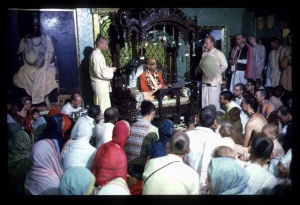CC Antya 16.131 (1975)

A.C. Bhaktivedanta Swami Prabhupada
Below is the 1996 edition text, ready to be substituted with the 1975 one using the compile form.
TEXT 131
- se phelāra eka lava, nā pāya devatā saba,
- e dambhe kebā pātiyāya?
- bahu-janma puṇya kare, tabe ‘sukṛti’ nāma dhare,
- se ‘sukṛte’ tāra lava pāya
SYNONYMS
se phelāra—of those remnants; eka—one; lava—small particle; nā pāya—do not get; devatā—the demigods; saba—all; e dambhe—this pride; kebā—who; pātiyāya—can believe; bahu-janma—for many births; puṇya kare—acts piously; tabe—then; sukṛti—one who performs pious activities; nāma—the name; dhare—bears; se—those; sukṛte—by pious activities; tāra—of that; lava—a fraction; pāya—one can get.
TRANSLATION
“Even after much prayer, the demigods themselves cannot obtain even a small portion of the remnants of such food. Just imagine the pride of those remnants! Only a person who has acted piously for many, many births and has thus become a devotee can obtain the remnants of such food.